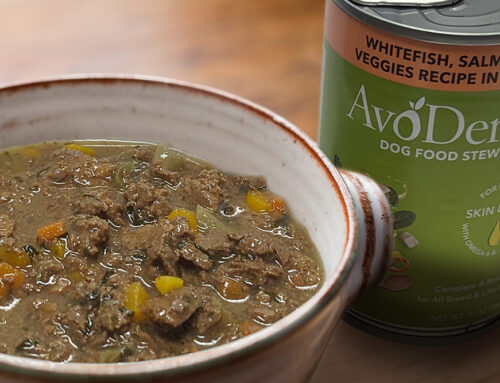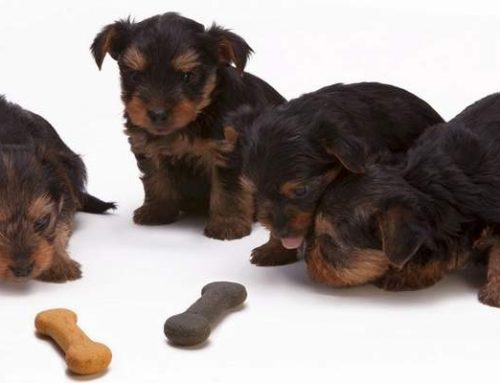Many pet parents have questions about whether or not their dog can thrive on a diet that includes grains and other plant-based ingredients or that skips meat altogether. There is lots of conflicting information online that can confuse dog owners about what their furry friend needs to be healthy.
If you’ve asked similar questions, you’ll be relieved to learn that your dog is an omnivore. She’ll be happy eating anything that tastes good, from meaty treats to whole grain kibble.
Understanding why dogs are omnivores and what that means for their nutritional needs is key to feeding them the healthiest diet possible. Learn about how to provide a complete, balanced diet so that your dog feels happy and strong.
Are Dogs Omnivores or Carnivores?
Of the three main diet categories of animals—carnivore, herbivore and omnivore—we know dogs are definitely not herbivores. Their love of bones and meat treats clearly shows us that. But experts have debated for years whether domestic dogs are technically omnivores or carnivores.
So what is an omnivore? The difference between the two categories is pretty simple on the surface: omnivores can survive on a diverse diet of meat, grains, fruits and vegetables. Carnivores, on the other hand, need to eat meat. So why can’t experts agree on which category our canine best friends belong to?
Dogs are Omnivores
Centuries of feeding domesticated dogs has shown that canines can live healthy lives on omnivorous diets. Still, it’s a good thing that pet parents are interested enough in their pet’s nutrition to question the benefits of non-meat ingredients in their dogs’ kibble.
Most biological evidence also points to dogs being omnivores. There are physical differences between the bodies of carnivores and omnivores that put dogs in the omnivore category. Learning about these differences is key to understanding how dogs have expanded their palettes over thousands of years.
Digestion
Omnivores typically have much longer digestive tracts than carnivores because it takes the body more time to break down plant material. For example, domestic cats are obligate carnivores. Their gastrointestinal tracts are significantly shorter than those of dogs. Meanwhile, a dog’s small intestine is similar in size to that of other omnivores.
Nutritional Requirements
Obligate carnivores need higher amounts of certain amino acids, arachidonic acid and vitamin A, all of which they get from meat. Dogs, on the other hand, can produce arachidonic acid from vegetable oil and vitamin A from the beta-carotene in plants.
Chewing
Herbivores and omnivores usually chew in a side-to-side motion while a dog’s jaw only moves up and down. Though this is more common in carnivores, a dog’s molars are relatively flat—a characteristic that’s similar to other plant-eating species. A flatter tooth shape is better for breaking up leaves, seeds and other fibrous plant parts.
Do Dogs Need to Eat Meat?
Dogs don’t need to eat meat to survive. They can subsist on plant material alone and are comfortable eating combinations of meat and non-meat foods. Even wild dogs and wolves can scavenge for grasses and berries when prey is scarce.
Many dog foods feature grains among their main ingredients. Some pet parents might be concerned about the presence of wheat, barley, rice or other grains in their dog’s food. But dogs have evolved to be able to digest grains and vegetables and thrive on a diet that includes them.
You might notice your dog eating grass when you take him out. Your dog can naturally digest grass and other plant material. This is not a worrying behavior and can have several causes, one of which is that he simply likes the taste of grass. Domesticated and undomesticated dogs are scavengers that will eat almost anything they find, so it’s no surprise that they’ll snack on fresh grass from the yard.
Many dog owners wonder if vegetarian dog food or vegan dog food is healthy for their pets. They worry that, despite being able to survive without animal-based protein, dogs fed a vegetarian diet won’t thrive. Being omnivores, dogs don’t have to eat meat; but should they?
Consider the ingredients in vegetarian dog food. Eggs, which are also found in many meat-based dog foods, are one of the most nutrient-dense protein sources available. There’s a reason they’re called a superfood. Eggs are a rich source of essential amino acids. They’re also full of vitamins, minerals and fatty acids.
Other vegetarian ingredients can provide protein for your dog, too. Whole grains, beans and soy are sources of important amino acids that contribute to your dog’s overall health.
Focus on Complete Nutrition
The most important part of canine nutrition is feeding your dog a complete, balanced diet, whether or not it includes meat as its primary protein source. This most often means feeding him food that contains a combination of animal protein, fatty acids, vitamins and minerals.
Dogs have evolved to be able to digest plant-based carbohydrates. In addition to meat and fats, they can use these carbs as a good source of energy.
The easiest way to choose a high quality food is to look for ingredients you know. A dry or wet food that features whole meats, meat meal, whole grains and other easily recognizable main ingredients will provide the most complete nutrition for your dog.
AvoDerm Natural Dog Food
AvoDerm Natural® dog foods contain only the highest quality ingredients. Our primary ingredients are easy to recognize and include avocado, a canine superfood, for additional protein, essential fatty acids and twenty vitamins and minerals. The protein in avocados is highly digestible and contains eighteen amino acids for muscle support and healthy organs. It’s a delicious, nutrient-rich ingredient to add to your dog’s diet.
Meat is an important source of protein for most dogs but it’s not the only ingredient your pup needs in his diet. Choose food with the highest-quality ingredients so you can ensure that he’s getting lots of protein and all of the right vitamins and minerals every day.
SOURCES:
- Coates, Dr. Jennifer. “Can Dogs Stay Healthy On A Vegetarian Diet?” PetMD, PetMD, 3 Jan. 2013.
- Scott, Dana. “Eggs: Why Your Dog Needs Them.” Dogs Naturally Magazine, Dogs Naturally Magazine, 17 Oct. 2018.
- “Mythbuster Monday! …Do Dogs Need Meat in Their Diets?” American Kennel Club, AKC, 25 July 2013.
AvoDerm and AvoDerm Natural are registered trademarks of Central Garden & Pet Company.





